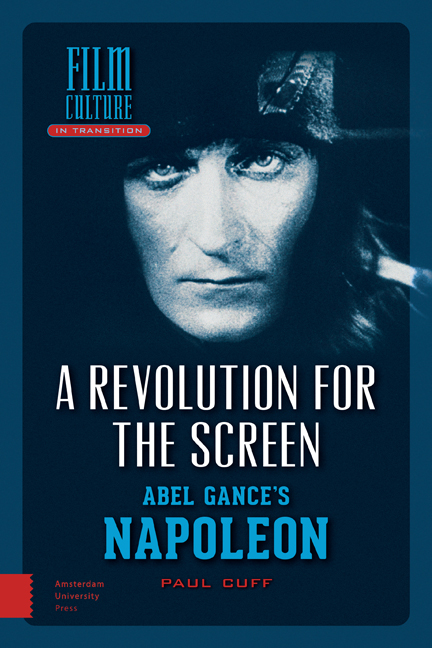Book contents
- Frontmatter
- Dedication
- Contents
- List of Illustrations
- Note on Formatting
- Acknowledgements
- Foreword
- Preface: Critical perspective
- 1 Napoleonic Ambition and Historical Imagination
- 2 Shaping Expectations: The Young Napoléon Bonaparte
- 3 Civilization and Savagery: Visions of the French Revolution
- 4 Mortal Gods: Voices of Power and of Providence
- 5 The Dark Light of Napoleonic Cinema
- 6 A View from the Margins of History
- 7 Melodrama and the Formulations of Family
- 8 Worlds in Transition: Class, consumption, Corruption
- 9 Death and Transfiguration
- Conclusion: The Case for Enthusiasm
- Filmography and Bibliography
- Index
- Film Culture in Transition
Conclusion: The Case for Enthusiasm
Published online by Cambridge University Press: 10 December 2020
- Frontmatter
- Dedication
- Contents
- List of Illustrations
- Note on Formatting
- Acknowledgements
- Foreword
- Preface: Critical perspective
- 1 Napoleonic Ambition and Historical Imagination
- 2 Shaping Expectations: The Young Napoléon Bonaparte
- 3 Civilization and Savagery: Visions of the French Revolution
- 4 Mortal Gods: Voices of Power and of Providence
- 5 The Dark Light of Napoleonic Cinema
- 6 A View from the Margins of History
- 7 Melodrama and the Formulations of Family
- 8 Worlds in Transition: Class, consumption, Corruption
- 9 Death and Transfiguration
- Conclusion: The Case for Enthusiasm
- Filmography and Bibliography
- Index
- Film Culture in Transition
Summary
I wish tomorrow's cinema to be the true image for which it was invented: a school of exuberance, energy, grandeur, power, of the metamorphosis of man beyond himself […] We must live out delirious fantasies, live perpetually in that intellectual exaltation which alone can jolt us out of that slow, so slow, biological rut of miserable evolution. We have to jump ever forward through hoops aflame with our own possibilities, never stopping at the dumbfounded sneering of bystanders. No matter how sublime the theatre or cinema we achieve, there will always be somebody to listen, to watch, even if they are only that part of ourselves which we have left behind on the way (Gance 1956-7 cited in Kaplan 1994: 44).
In the nineteenth century, Victor Hugo's conversion from monarchism to republicanism was aesthetic as well as political. He argued that ‘Language was the State’ until 1789, whereupon the French Revolution unleashed the expressive potential of art (Hugo 1834: 31). La Marseillaise was not just a national hymn but an artistic call to arms: ‘Aux armes, prose and verse! Formez vos bataillons!’ Acting as the Danton and Robespierre of language, Hugo claimed to have ‘stormed and demolished the Bastille of rhymes’; traditional expressive formulae were the kings and titled aristocrats of language, making the Revolutionary poet ‘the devastator of the old ABCD’ who ‘declares all words equal, free, adult’. Thus, it is through popular art that the Revolution remains ‘vibrant in the air, in voices, in books. / In living words, the reader feels her life. / She shouts, she sings, she instructs, she laughs’ (ibid.: 30-7). This project of liberation was continued by the Modernists of the twentieth century. Blaise Cendrars's essay ‘L’ABC du cinéma’ draws a breathless route from ancient civilizations to the birth of photography and the ‘Eternal Revolution’ of cinema. Thanks to filmmaking, the ‘floodgates of the new language are open’ and ‘everything becomes possible’ – modern art could construct ‘The Gospel of Tomorrow’ (1919-21: 165). Through this utopian ideology, Abel Gance traced a direct path from the French Revolution to his own work as a filmmaking artist.
In the 1920s, Gance's reanimation of the Napoleonic myth was a reaction to the realities of a divided modern Europe; his film sought to inject post-war society with an impetus for change.
- Type
- Chapter
- Information
- A Revolution for the ScreenAbel Gance's Napoleon, pp. 243 - 248Publisher: Amsterdam University PressPrint publication year: 2015



